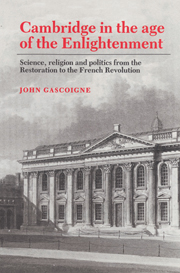 Cambridge in the Age of the Enlightenment
Cambridge in the Age of the Enlightenment Published online by Cambridge University Press: 24 August 2009
When the high churchmen were restored to their positions at Cambridge after the Restoration they were returning to a university where the intellectual climate had changed in their absence, Sancroft said as much in a letter to his old tutor, Ezekiel Wright, in 1663 in which he lamented that the ‘old genius and spirit of learning’ he had known and admired at Emmanuel before the ‘age of sorrow’ were no longer diligently pursued, ‘the Hebrew and Greek learning being out of fashion everywhere … and the rational learning they [now] pretend to being neither the old philosophy nor steadily any one of the new’ (D'Oyly, 1821, 1: 128).
Largely thanks to Henry More, Interregnum Cambridge had become known for its interest in the work of Descartes (Webster, 1975: 134) – thus Glanvill, who graduated from Oxford in 1655, later ‘lamented that his friends did not first send him to Cambridge, because that new philosophy [Cartesianism] and art of philosophizing were there more than here in Oxon’ (Webster, 1969: 360). The study of Descartes led in turn to a more general debate about the fundamentals of natural philosophy which continued to be a part of the university's intellectual milieu after the Restoration, leaving its mark on Newton's early studies (McGuire and Tamny, 1983; Gascoigne, 1985).
To save this book to your Kindle, first ensure no-reply@cambridge.org is added to your Approved Personal Document E-mail List under your Personal Document Settings on the Manage Your Content and Devices page of your Amazon account. Then enter the ‘name’ part of your Kindle email address below. Find out more about saving to your Kindle.
Note you can select to save to either the @free.kindle.com or @kindle.com variations. ‘@free.kindle.com’ emails are free but can only be saved to your device when it is connected to wi-fi. ‘@kindle.com’ emails can be delivered even when you are not connected to wi-fi, but note that service fees apply.
Find out more about the Kindle Personal Document Service.
To save content items to your account, please confirm that you agree to abide by our usage policies. If this is the first time you use this feature, you will be asked to authorise Cambridge Core to connect with your account. Find out more about saving content to Dropbox.
To save content items to your account, please confirm that you agree to abide by our usage policies. If this is the first time you use this feature, you will be asked to authorise Cambridge Core to connect with your account. Find out more about saving content to Google Drive.